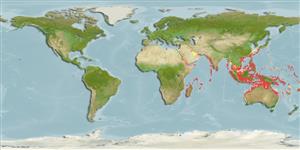Preferred temperature (Ref.
115969): 24.6 - 29, mean 28 (based on 1234 cells).
Phylogenetic diversity index (Ref.
82804): PD
50 = 0.5000 [Uniqueness, from 0.5 = low to 2.0 = high].
Bayesian length-weight: a=0.01122 (0.00705 - 0.01786), b=3.00 (2.87 - 3.13), in cm Total Length, based on LWR estimates for this species & Genus-body shape (Ref.
93245).
栄養段階 (Ref.
69278): 3.7 ±0.5 se; based on diet studies.
回復力 (Ref.
120179): 低い, 4.5年~14年の倍増期間の最小個体群 (Preliminary K or Fecundity.).
Fishing Vulnerability (Ref.
59153): Moderate to high vulnerability (50 of 100).
Climate Vulnerability (Ref.
125649): High to very high vulnerability (66 of 100).
